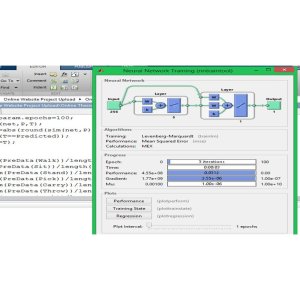Optimized Data Storage Placement in Wireless Sensor Networks
Problem Definition
Problem Description: One of the major challenges in wireless sensor networks is optimizing the placement of storage nodes to efficiently store and retrieve large amounts of data collected by sensor nodes. The current data storage system in sensor networks faces issues with storage capacity and data retrieval, leading to increased communication costs within the network. In addition, the energy consumption for gathering and storing data needs to be minimized to prolong the lifespan of sensor nodes. Therefore, there is a need to address the problem of optimizing storage placement in sensor networks to improve data storage efficiency, reduce communication costs, and minimize energy consumption for data retrieval and storage.
Proposed Work
The project titled "OPTIMIZE STORAGE PLACEMENT IN SENSOR NETWORKS" focuses on addressing the issue of data storage in wireless sensor networks. With the continuous exchange of large amounts of data between sensor nodes, the introduction of storage nodes becomes essential to efficiently store and retrieve data in the network. This project aims to minimize communication costs by centralizing data storage at storage nodes, while also considering energy cost minimization for data gathering. Additionally, stochastic analysis for random node deployment is conducted. The simulation evaluates both deterministic and random placements of storage nodes, showcasing the effectiveness of the proposed solution.
This research falls under the category of NS2 Based Thesis Projects and Wireless Research Based Projects, with a specific focus on WSN Based Projects. The software used for the simulation and analysis in this project includes NS2.
Application Area for Industry
The project "OPTIMIZE STORAGE PLACEMENT IN SENSOR NETWORKS" can be utilized in various industrial sectors such as manufacturing, agriculture, healthcare, and environmental monitoring. In manufacturing industries, sensor networks are used for monitoring equipment performance, inventory tracking, and quality control. By optimizing storage placement, manufacturers can efficiently store and retrieve data related to production processes, leading to improved productivity and reduced downtime. In agriculture, sensor networks are employed for monitoring soil conditions, crop health, and irrigation systems. With optimized storage placement, farmers can better manage and analyze the data collected by sensors, resulting in more informed decision-making and increased crop yields.
In the healthcare sector, sensor networks play a crucial role in monitoring patient vital signs, managing medical equipment, and tracking medication inventory. By optimizing storage placement, healthcare providers can streamline data storage and retrieval processes, leading to quicker response times and improved patient care. Finally, in environmental monitoring, sensor networks are used to track air quality, water pollution, and wildlife habitats. By optimizing storage placement, environmental agencies can efficiently store and access environmental data, facilitating better conservation efforts and resource management. Overall, the proposed solutions in this project address the specific challenges industries face in terms of data storage efficiency, communication costs, and energy consumption in wireless sensor networks, ultimately leading to improved operational efficiency and cost savings.
Application Area for Academics
MTech and PHD students can leverage the proposed project on optimizing storage placement in sensor networks for their research endeavors. This project offers a significant contribution to the field of wireless sensor networks by addressing the critical issue of data storage optimization. By utilizing the code and literature of this project, students can explore innovative research methods, conduct simulations, and perform data analysis for their dissertations, thesis, or research papers. The relevance of this project lies in its potential applications in improving data storage efficiency, reducing communication costs, and minimizing energy consumption in sensor networks. MTech students and PHD scholars specializing in network simulations, data analysis, and wireless communication technologies can benefit greatly from this project.
The project's focus on NS2 simulation software and its specific coverage of WSN based projects make it a valuable resource for researchers in these domains. Furthermore, the future scope of this project includes opportunities for further advancements in optimizing storage placement strategies and enhancing the overall performance of wireless sensor networks.
Keywords
wireless sensor networks, storage nodes optimization, data storage efficiency, communication costs, energy consumption, sensor nodes lifespan, storage placement, data retrieval, NS2, stochastic analysis, random node deployment, deterministic placements, wireless research projects, WSN projects
| Shipping Cost |
|
No reviews found!



















































No comments found for this product. Be the first to comment!